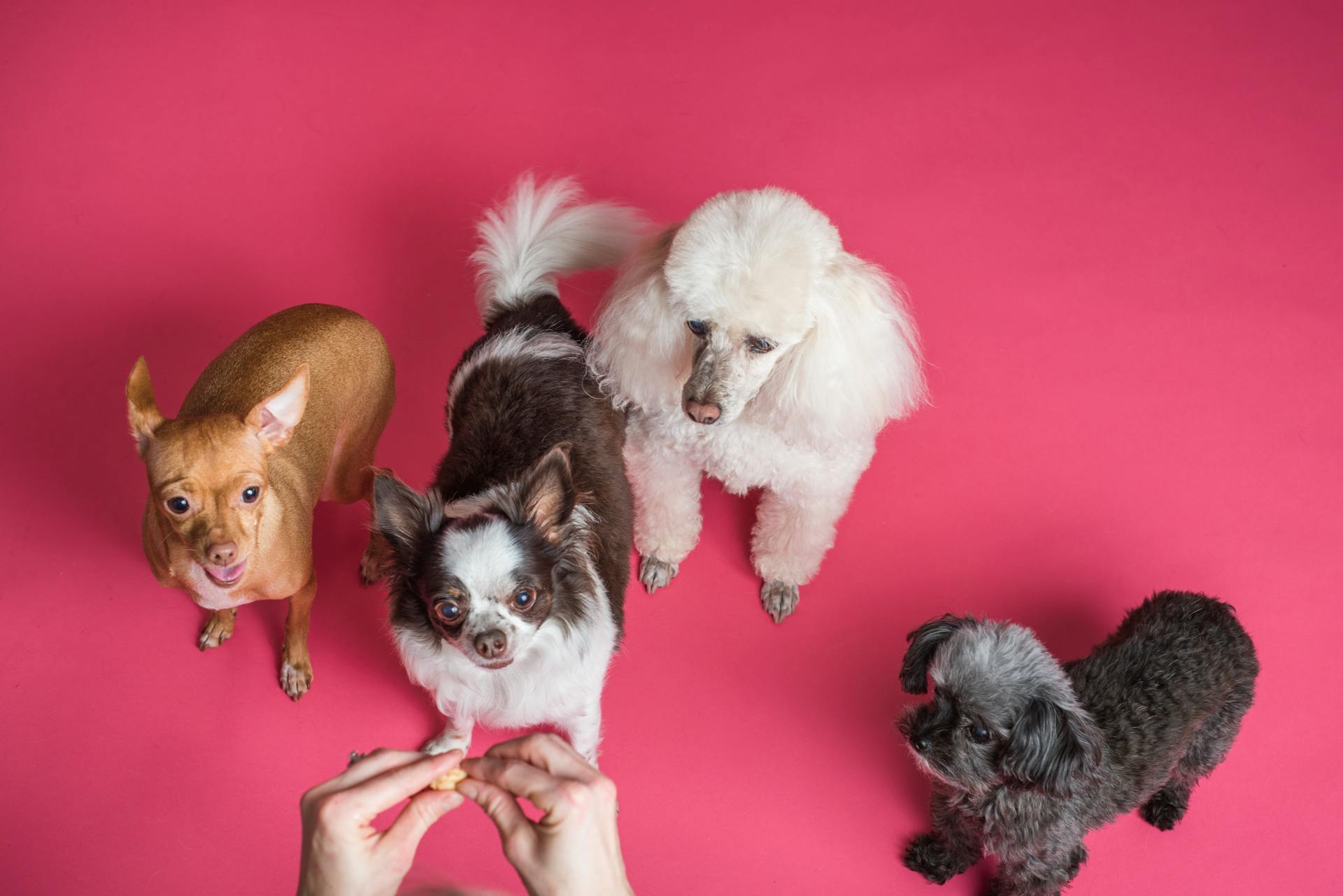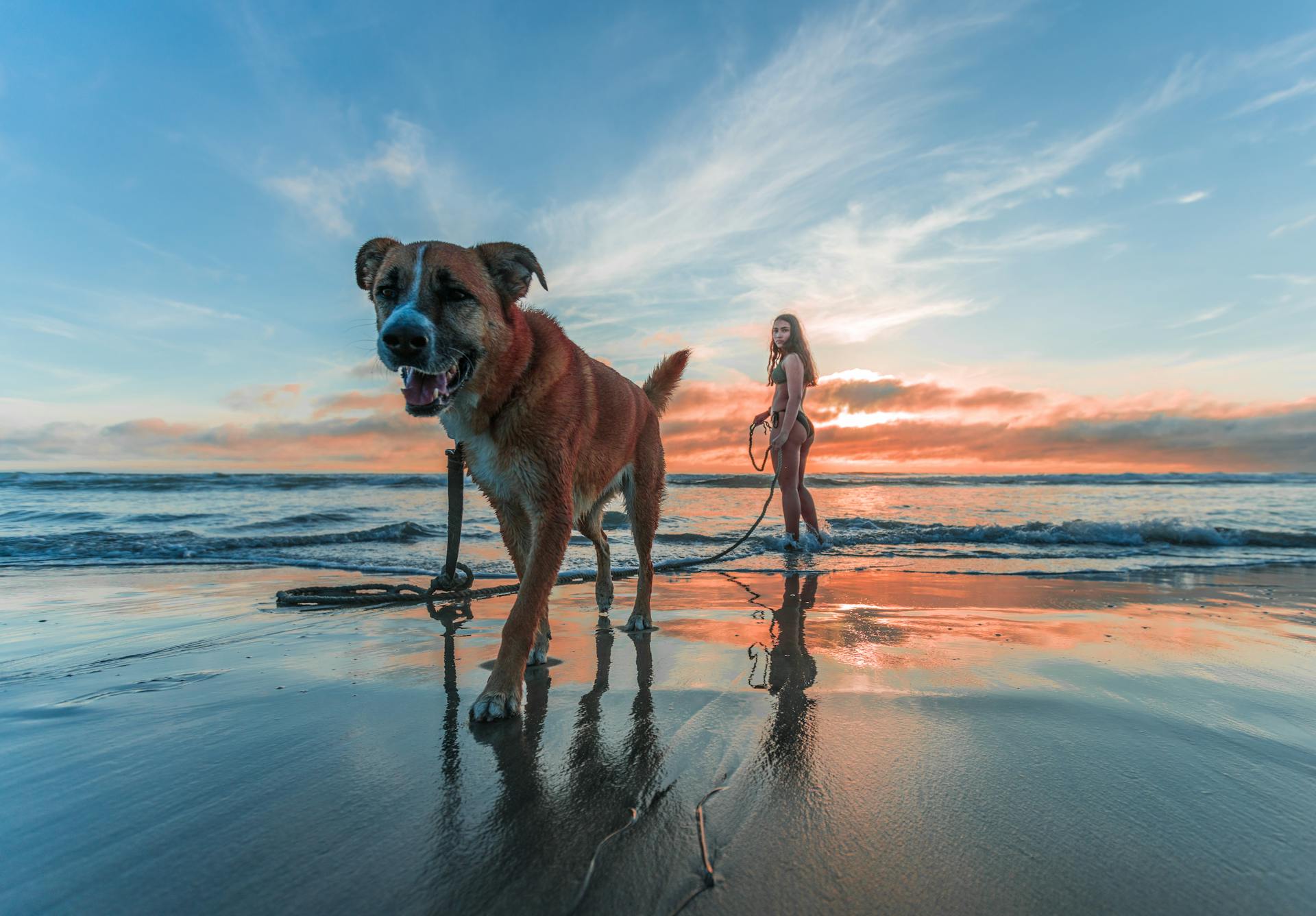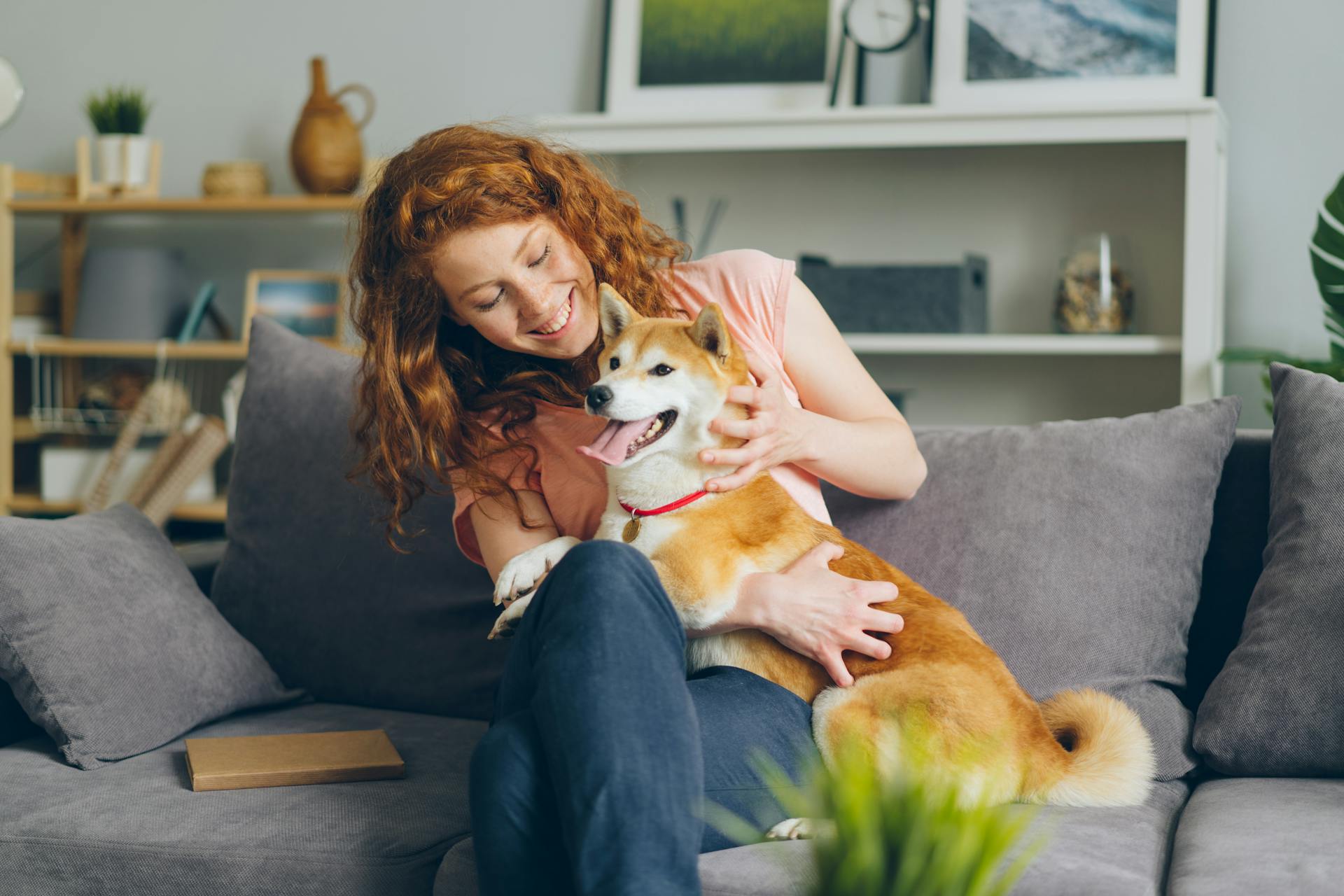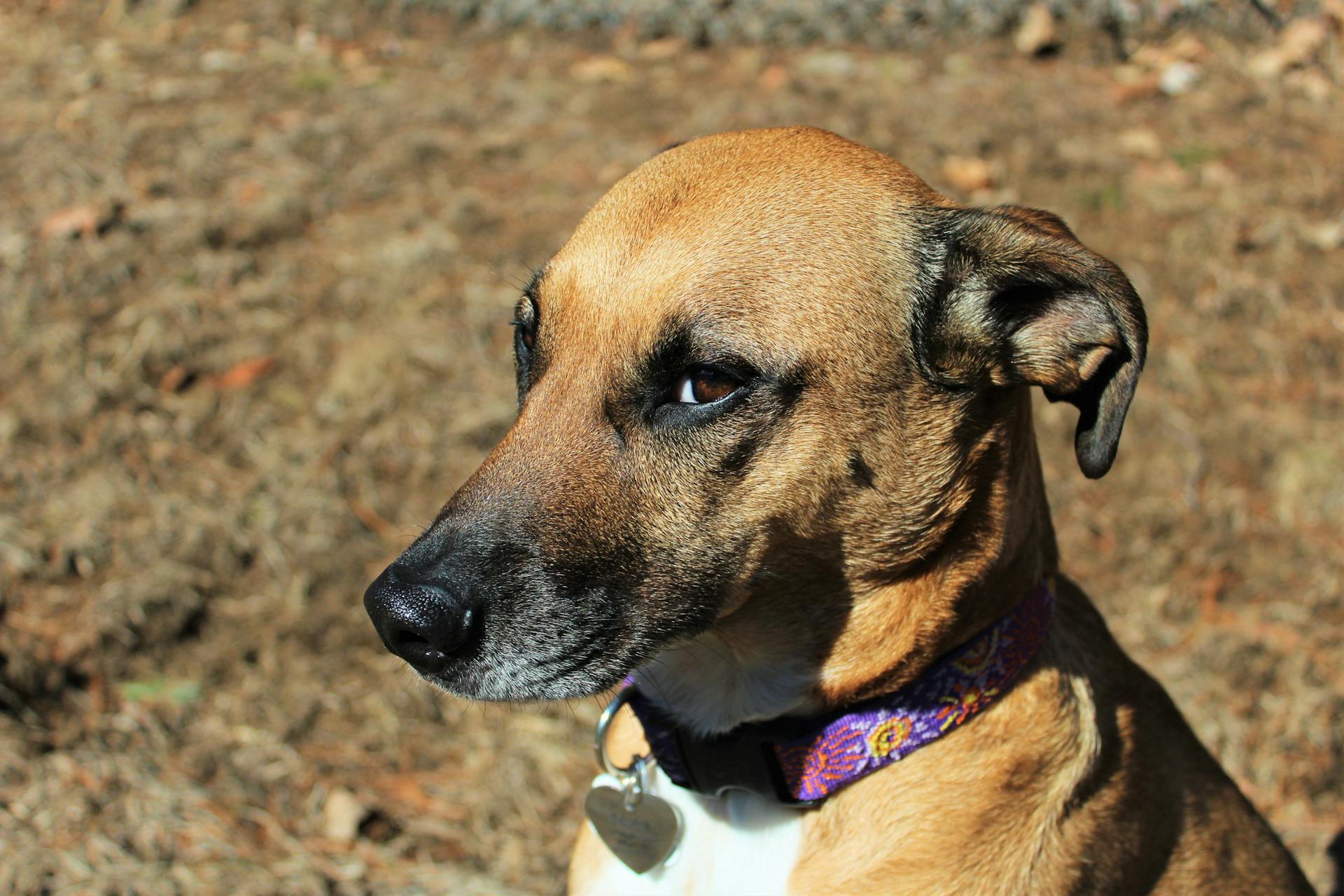
To start a dog daycare business, you'll need to obtain a license from your local government. This license typically requires a permit and a business registration.
In most states, you'll need to register your business with the Secretary of State and obtain a fictitious business name if you're not using your own name. Some states also require a business license, which can be obtained from the state or local government.
Before applying for a license, make sure you've met the minimum requirements for the business, such as liability insurance and a health inspection. This can help speed up the application process and avoid any issues down the line.
Recommended read: What States Require a Dog Grooming License
Obtain Necessary Licenses
Obtaining the necessary licenses is a crucial step in starting a dog daycare business. This includes getting a general business license, which is required to operate any business.
You'll also need a daycare license, which is specific to your type of business. This license ensures that your facility meets certain standards for caring for dogs.
In addition to these licenses, you may need a USDA license, which is required for businesses that handle animals. This license ensures that your facility is following proper animal care and handling procedures.
You'll also need an animal transfer license, which allows you to transport animals to and from your facility. A seller's permit may also be required, depending on your location.
Here's a list of some of the licenses and permits you may need to obtain:
- General business license
- Daycare license
- USDA license
- Animal transfer license
- Seller's permit
Remember to check with your local authority to see what specific licenses and permits are required in your area. This will help you avoid any potential legal issues down the road.
Facility Requirements
Facility Requirements are a crucial aspect of obtaining a dog daycare license. You must meet all relevant building codes, including those related to safety, sanitation, and accessibility.
The facility must be designed and maintained to provide a safe and comfortable environment for the dogs in your care. This includes requirements for temperature, ventilation, lighting, and access to clean water and food.
Staffing requirements may vary depending on the size of your facility and the number of dogs in your care. You may need to have a certain number of staff members on hand at all times.
You must also provide a suitable environment for dogs, including a choice of areas for them to relax and play. This can include separate spaces for different breeds, sizes, and temperaments.
Here are some key facility requirements to consider:
You must also ensure that the facility is clean and free from vermin at all times. This includes regularly cleaning and disinfecting equipment and surfaces, and providing a separate hand wash basin with hot and cold water for staff to wash their hands.
Operational Requirements
Operational Requirements are in place to ensure the health and well-being of the dogs in your care. Vaccinations are a must, with current records required for each dog.
You may need to provide proof of vaccination, so keep those records up to date. Regular health screenings are also a must, checking for parasites, fleas, and other signs of illness or disease.
Exercise and socialization are crucial for the dogs in your care. Specific rules and guidelines vary depending on your location and services offered, so be sure to check local regulations.
Here are the key operational requirements to keep in mind:
- Vaccinations: Current vaccination records required for each dog.
- Health screenings: Regular checks for parasites, fleas, and signs of illness or disease.
- Exercise and socialization: Regular opportunities for exercise and canine companionship.
- Record-keeping: Detailed records of each dog, including vaccinations, health screenings, and incidents or injuries.
It's essential to note that these are general rules and regulations, and you should always check with your local government agency and/or an attorney to ensure compliance with local laws and regulations.
Operational Requirements
As you plan your dog daycare business, it's essential to understand the operational requirements that will ensure the health and well-being of the dogs in your care.
All dogs under your care must have current vaccination records, and you might need to present documentation of each dog's immunizations.
Regular health screenings are crucial to detect any signs of disease or illness. You could be expected to inspect the dogs under your care for fleas, parasites, and other indications of disease or illness.
A unique perspective: Dog Daycare for Reactive Dogs
Providing regular opportunities for exercise and canine companionship is vital for the dogs in your care. The specific laws and regulations governing this might change based on where you live and the caring services you provide.
To guarantee the dogs in your care receive the best possible experience, you need to maintain thorough records for every dog. This includes details on vaccinations, examinations, and any accidents or injuries that may arise.
Here are the key operational requirements to keep in mind:
- Vaccinations: Current vaccination records for all dogs under your care.
- Regular health screenings: Inspect dogs for fleas, parasites, and other signs of disease or illness.
- Socialization and exercise: Provide regular opportunities for exercise and canine companionship.
- Record-keeping: Maintain thorough records for every dog, including vaccinations, examinations, and incidents.
Monitoring and Training
Monitoring and training are crucial aspects of any dog day care facility. All dogs must be screened before admission to ensure they're not afraid, anxious, or stressed in the presence of other dogs or people, and don't pose a danger to others.
Screening involves checking the dog's behavior and temperament, and keeping a record of each screening done. This is essential to ensure the dog's well-being and safety.
Curious to learn more? Check out: Is Dog Daycare Good for Dogs
Equipment used in the facility must be safe for the dogs, and any toys provided must be in good condition. Leads must be removed if they pose a risk to the dog.
A clear plan must be in place for monitoring behavior, including regular walks and access to a secure open area. For dogs that can't be exercised due to veterinary reasons, alternative enrichment activities must be planned.
Unused medications must be returned to the owner or prescribing vet, and stored in a fridge at the correct temperature. Cleaning and disinfection products must be used as per the manufacturer's instructions, and kept out of reach of animals.
Here's a summary of the essential equipment and supplies needed for monitoring and training:
By following these guidelines, you can ensure a safe and healthy environment for the dogs in your care.
No Overnight Stays
No Overnight Stays is a crucial aspect of operational requirements. In fact, it's explicitly stated that no overnight stays are permitted.
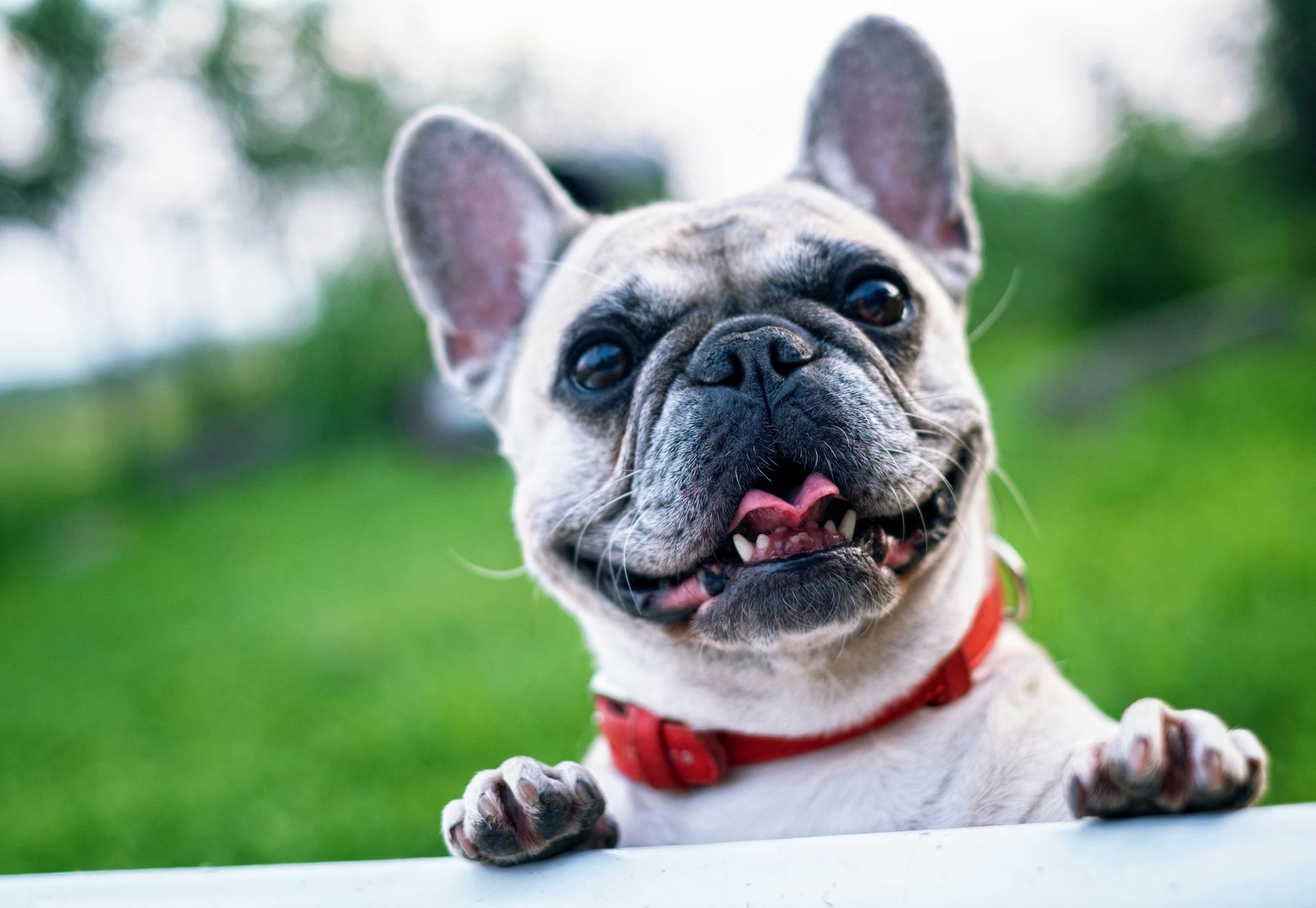
You'll need to keep this in mind, as it's mentioned in section 20.0 that overnight stays are not allowed. It's essential to adhere to this rule.
Dogs are not permitted to stay overnight, as outlined in section 20.1. This is a clear and straightforward policy.
If you're planning to bring dogs to the area, you'll need to make arrangements for their care outside of overnight hours. Each dog must be provided with food, water, and other necessities, as specified in section 21.1.
Take a look at this: Two Service Dogs
Staff and Safety
To ensure the welfare of dogs in daycare, it's crucial to have sufficient staff to meet each dog's individual needs. The business must have enough staff to care for 10 dogs or less per person.
Staff qualifications and experience are also essential. They must have the competence to identify normal dog behavior and recognize signs of pain, suffering, injury, disease, or abnormal behavior. They should be trained in animal welfare, animal handling, animal behavior, cleanliness and hygiene, feeding and preparing food, preventing and controlling disease, recognizing sick or injured animals, and giving first aid.
To maintain staff competence, a written training policy must be implemented and reviewed annually. This policy should include an annual appraisal, planned continued professional development, and recognition of any knowledge gaps. Staff participation can be shown through records of courses taken, written or online learning, and keeping up to date with research or developments for specific breeds.
Animal Handling
Animal handling is a crucial aspect of any day care facility. It's essential to ensure that all staff members are competent in handling animals to protect them from pain, suffering, injury, or disease.
Dogs must be handled humanely and in a way that suits their individual needs to minimize fear, stress, pain, or distress. This means never punishing them so they become frightened or display agitated behaviour.
Staff must be able to recognize and act upon undesirable behaviours in dogs. This is a critical skill for any animal care professional.
Dogs must be kept separately or in suitable compatible social groups, taking into account their species and individual needs. This is especially important for social species that shouldn't be isolated from others of their kind.
If a dog exhibits aggressive behaviour, it must be separated from all other dogs in all settings. This is a safety precaution to prevent injuries.
Dogs that need to be kept away from other dogs must be given alternative forms of mental stimulation to prevent boredom and stress.
A written policy must be followed when introducing a new dog to a group to minimize stress on the new and existing animals.
Consider reading: New Dog License Law in Pa
Pet and Staff Safety Evaluation
Before admitting a dog to a day care facility, it must be screened to ensure it's not afraid, anxious, or stressed in the presence of other dogs or people, and doesn't pose a danger to others.
All dogs must be evaluated to assess their temperament, which involves interviewing pet parents, conducting evaluations and observations, and taking notes to reference while assigning dogs to playgroups.
Leads must be removed if they're a risk to the dog when in the facility, and any items brought in with a dog must be recorded and checked for safety, including toys which must be safe and in good condition.
Cleaning and disinfection products must be used as per the manufacturer's instructions, and disinfectant products must kill viruses as well as bacteria.
Staff must be competent in the safe use of cleaning products and detergents, and cleaning products must be kept entirely out of the reach of animals.
If a dog exhibits aggressive behaviour, it must be separated from all other dogs in all settings, and given other forms of mental stimulation.
The facility must be able to keep new dogs away from others if needed, and have a written policy in place to monitor a new dog added to a group to avoid stress to new or existing animals.
Staffing
Staffing is a crucial aspect of any facility that cares for dogs. Each member of staff should have no more than 10 dogs to care for to ensure individual welfare needs are met.
The business must have enough staff to meet all dogs' individual welfare needs fully. This includes considering factors such as the breed, age, health status, and needs of the dogs.
Staff qualifications and experience are also vital. They must be trained in animal welfare, including recognising poor welfare, animal handling, animal behaviour, cleanliness and hygiene, feeding and preparing food, preventing and controlling disease, recognising sick or injured animals, and giving first aid to sick or injured animals.
Staff must either hold a formal qualification such as a Level 2 qualification regulated by the Office of Qualifications and Examinations Regulation (Ofqual) or show they have relevant and sufficient knowledge and experience.
Business Setup
To set up your dog daycare business, you'll need to determine the best business structure for your needs. You have four options: sole proprietorship, partnership, corporation, or limited liability company (LLC).
Each state has different requirements and specific health and safety regulations for animal-related businesses. You'll need to check your state and local laws to determine the licenses or permits you need to start your business. You may need a business license, and you'll need to register your business with your state government.
Consider reading: Do You Need a Dog License in Ohio
Here are the basic business structures to consider:
- Sole Proprietorship: Easiest to form, but you can be held personally liable for your business's debts.
- Partnership: You and your partners share liability.
- Corporation: Your business can be held liable for debts or lawsuits rather than you.
- Limited Liability Company (LLC): Your personal assets are protected from business debts or lawsuits.
It's a good idea to consult with a lawyer to help with the legal details of setting up your business.
Starting a Business: Step by Step
To start a dog daycare business, you'll need to determine the right business structure for your needs. Consider your goals and choose from a sole proprietorship, partnership, corporation, or limited liability company (LLC).
A sole proprietorship is the easiest structure to form, but you'll be personally liable for business debts. A partnership shares liability among owners, while a corporation and LLC offer more protection for your personal assets.
To register your business, you'll need to choose a structure and then register with your state government. It's a good idea to consult a lawyer to help with the legal details.
Before you can open your doors, you'll need to obtain necessary licenses and permits, which vary by state and locality. Keep accurate records to stay on top of your business's finances and comply with regulations.
Here are the basic business structures to consider:
Business Startup Requirements
To start a dog daycare, you'll need to determine your business entity structure. You have options like a sole proprietorship, partnership, corporation, or limited liability company (LLC). Each has its pros and cons, so choose one that aligns with your long-term business goals.
You'll also need to register your business with your state government and consult a lawyer to help with the legal details. This is crucial to ensure you're meeting all the necessary requirements.
To operate a dog daycare, you'll need to obtain necessary licenses and permits. This can vary depending on your location, but it's essential to check your state and local laws and regulations.
You'll need to invest at least $80,000 to get your dog daycare off the ground, covering fees like insurance, construction, equipment, and more.
To guarantee a seamless transition from concept to reality, break down the process of opening a dog daycare into manageable phases.
For more insights, see: Do You Need a License to Open a Dog Daycare
Some essential requirements for a dog daycare include obtaining a business license, registering your company with the federal or state authorities, and verifying that your location is approved for commercial use.
Here are some key business startup requirements to keep in mind:
- Business license: Required for any business operating within a certain jurisdiction.
- Zoning laws: Ensure your location is approved for commercial use.
- Insurance: Essential for safeguarding both you and your enterprise in case of accidents or injuries.
Remember, the financial aspect of a dog daycare business is crucial. Consider investing at least $80,000 to cover startup costs, and don't forget to factor in ongoing expenses like insurance and equipment maintenance.
Rules and Regulations
You'll need to comply with various rules and regulations to obtain a dog daycare license. Building codes are a must, covering safety, sanitation, and accessibility. Your facility must meet all relevant building codes.
Facility design and maintenance are crucial for animal welfare. Dogs in your care must have access to clean water, food, and a safe environment. Temperature, ventilation, lighting, and sanitation are also key considerations.
Staffing requirements vary depending on the size of your facility and the number of dogs in your care. You may need to have a specific number of staff members on hand at all times.
Vaccination requirements are essential for dog daycare operations. All dogs in your care must be up-to-date on their vaccinations, and you may need to provide proof of vaccination.
Regular health screenings are also required, including checks for parasites, fleas, and other signs of illness or disease. You may need to conduct these screenings on a regular basis.
Dogs in your care must have regular exercise and opportunities for socialization. Specific rules and guidelines for this vary depending on your location and the services you offer.
Record-keeping is critical for dog daycare operations. You may need to keep detailed records of each dog in your care, including information about vaccinations, health screenings, and any incidents or injuries that occur.
Here are some key rules and regulations to consider:
- Building codes: safety, sanitation, and accessibility
- Animal welfare: temperature, ventilation, lighting, sanitation, and access to clean water and food
- Staffing: specific number of staff members on hand at all times
- Vaccination requirements: up-to-date vaccinations and proof of vaccination
- Health screenings: regular checks for parasites, fleas, and illness
- Exercise and socialization: regular opportunities for dogs in your care
- Record-keeping: detailed records of each dog's vaccination, health screening, and incident history
Sources
- https://easybusypets.com/blog/starting-a-dog-daycare-everything-you-need-to-know
- https://www.gingrapp.com/blog/starting-a-dog-daycare
- https://www.petsitusa.com/how-to-start-a-doggy-daycare/
- https://www.gov.uk/government/publications/animal-activities-licensing-guidance-for-local-authorities/dog-day-care-licensing-statutory-guidance-for-local-authorities
- https://www.mywaggytailsbusiness.co.uk/resources/dog-care-licensing/
Featured Images: pexels.com
